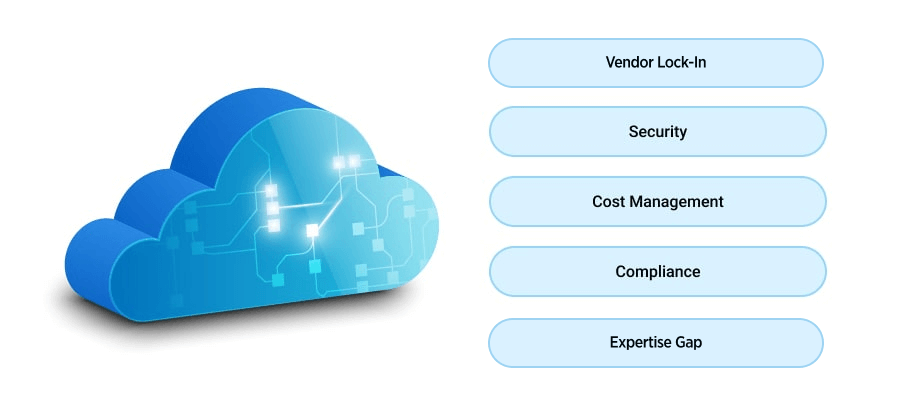Cloud computing is growing in popularity across countries. In 2024, the worldwide public cloud computing market is expected to reach an estimated $679 billion. The reason for this growth is often the desire of companies for more flexibility and scalability when it comes to data storage and processing.

With more and more companies transitioning to the cloud or a hybrid arrangement, business leaders may be curious about what cloud-based data management actually entails. If you are one of them, keep on reading.
In today’s post, we’re going to discuss the development of a cloud data management strategy, why it may be a good idea, and the challenges that one may expect when opting for this approach.
What Makes Cloud Data Management Appealing
Enterprise cloud data management is basically when you choose to implement cloud-based platforms and tools that help manage your digital infrastructure. So, when developing data warehouses or lakes and building pipelines, you opt for deploying it all in the cloud instead of on-premises.
Learn more about Enterprise Data Management
As we have seen above, companies are increasingly relying on cloud computing and migrating their IT systems to the cloud. Naturally, you may be asking yourself why that is. So, let’s take a quick look at the benefits an enterprise can observe from cloud data management.
Benefits of Cloud-Based Data Management
There are multiple advantages we can discuss when it comes to data management in the cloud. However, there are three concrete pros that often cause businesses to seriously consider this approach.
Scalability
With cloud-based solutions, you can benefit from better scalability than with on-premises deployment. In the cloud, more storage or computing power can be added whenever needed. Similarly, capabilities can be reduced if you no longer require them. This can be highly attractive to organizations that value flexibility.
Accessibility
Leveraging cloud data management services offers enhanced accessibility. Users can simply reach data from anywhere with an internet connection. Some cloud solutions also support offline access to certain resources. Such flexibility ensures that employees can collaborate and make decisions quickly, regardless of their physical location. This is particularly beneficial for remote teams and global operations as they often require real-time data access.
Security
With data managed in the cloud, you can rest assured that it’s safe. This is because leading providers of cloud data management solutions often have robust software and more resources dedicated to security than individual organizations can afford. They implement high-standard security measures like encryption, multi-factor authentication, and regular security audits. In the end, these activities protect data from breaches and unauthorized access.
Automated Updates
Another major benefit of pursuing a cloud-based data management infrastructure is the automated updates that come with it. With this strategy, the cloud vendor will take care of implementing any necessary updates into the cloud system so that you can focus on other tasks.
Lower Costs
Since cloud tools are more flexible and don’t require you to purchase and maintain your own hardware, the company’s bottom line will be positively affected. As cloud data management is typically associated with lower costs, it’s no surprise organizations are increasingly considering it.
Disaster Recovery
Lastly, managing data in the cloud means you won’t have to worry about automated backup and recovery solutions — your cloud provider will do it for you. Regular backups ensure that data can be quickly restored in case of loss or disaster. As you can guess, this minimizes downtime and supports business continuity, providing peace of mind that your critical data is protected against unexpected incidents.
How to Create an Effective Cloud Data Management Strategy

Now that you’re familiar with the advantages of the cloud, you are probably curious to find out what it takes to develop a good cloud data management strategy. So, let’s discuss the concrete steps you may want to take on this journey. After all, it’s best to be prepared and know what to expect.
1. Identify Objectives
Just like in traditional data management, with the cloud, everything begins with identifying your goals and objectives. If you’re only at the beginning of your journey, it’s time to figure out what data sources you usually work with or might rely on in the future. Plus, you should outline how the digital information flows through your company, and determine the goals you want to accomplish.
On the other hand, if you already have a solid data strategy in place and simply want to migrate existing systems and workflows onto the cloud, think about the objectives you want to reach by doing so. Otherwise, how will you know that transitioning to the cloud was worth it?
Discover how we performed Cloud-to-Cloud Infrastructure Migration
2. Choose the Right Cloud Service Model and Tools
Next, you need to take a look at different cloud providers to determine which one, or multiple, are best suited for your company. The most popular vendors at the moment are Amazon Web Services, Microsoft Azure, and the Google Cloud Platform. They have similar functionalities and offerings, but it’s still a good idea to learn more about each one before making a commitment.
Then, you also need to select the appropriate cloud service model — be it SaaS, PaaS, or IaaS — that suits your specific data management goals better. The choice can significantly impact how you handle, secure, and analyze data as each model provides different levels of control, flexibility, and responsibility.
- SaaS simplifies data management by outsourcing infrastructure and application maintenance to the provider. Thus, it makes it easier to focus on data insights and usage.
- PaaS, on the other hand, provides a balanced approach with managed platforms that support custom development and data processing needs.
- With IaaS, you have maximum control over your data infrastructure, allowing for highly customized and optimized data solutions.
Understanding these differences ensures that you have the best provider and the right service model to support your unique business use case. Of course, if you’re outsourcing and working with an experienced software development partner, they’ll be able to guide you and advise on the most suitable solution.
Read up on the Best Practices for Outsourcing Software Development
Additionally, at this point, it’s good to think about data-related platforms you may be missing. Would your organization benefit from a data warehouse? Or, have you been meaning to implement a data lake so that any digital information that flows through your company can be stored for later use? If so, this is the time to make the decision on whether you’ll pursue the development of these solutions or not.
3. Develop Thorough Data Processes
Now that you know your objectives and have identified the technology that will help achieve them, it’s time to actually implement the chosen software, build the data pipelines, and get access to informative analytics.
Here, you want to remember that to develop strong data processes you need to think about all elements of digital information management — collection, preparation, storage, and analysis. So, don’t forget to answer the following questions and implement software to help with all the related areas:
- What are your main data sources?
- How will digital information be collected?
- Do you need structured, unstructured data, or both?
- How will you carry out the cleansing and transformation of raw data?
- Where will the digital information be stored?
- How will you ensure security?
- How will data insights be communicated?
4. Establish Data Governance
Once your cloud software is in place, you’ve got to establish data governance policies. Essentially, this means outlining standards and procedures that should be followed by everyone in the company to prevent data corruption, loss, and security breaches.
Additionally, it should cover regulatory compliance nuances and guidelines on how that can be ensured. In highly regulated industries like healthcare or finance, this is particularly important.
5. Train Your Team
Finally, to truly benefit from your newly developed cloud strategy, you’ve got to train your employees and make sure they know the new procedures.
How can they utilize the new solutions? Which types of analytics can they run and how? Who should they turn to for help if there are any issues? All of these questions should be answered throughout training so that everyone knows how to work with the new strategy and ensure its success.
Key Challenges of Cloud Data Management

We’ve now covered the main steps of cloud data management and you may be eager to get started. Not so fast. Before you begin, let’s quickly go over some of the challenges you may face when relying on cloud computing. Of course, they shouldn’t deter you, but it’s always best to be prepared.
Security
You may think we’re repetitive and controversial as we’ve already mentioned this when covering benefits. How come? You see, many organizations are hesitant about cloud computing because they think it is a challenge to ensure security. It might seem that when digital information is stored on remote servers and accessed through the Internet, it is more susceptible to cyber-attacks and breaches.
Well, while the cloud safeguards your data and vendors tend to have established security practices in place, you should also think about how you will ensure data safety on your end. And this becomes a challenge.
Find out how Velvetech Protected Clinics from Security Breaches
Compliance
Stemming from the data security challenge we’ve outlined above, those who rely on the cloud may also face new difficulties with regulatory compliance. While cloud providers offer compliance reports from third-party auditors and other relevant documentation, it’s always your responsibility to go through these files and check if they are sufficient.
In short, just remember that it’s always up to you to adhere to the latest regulations that pertain to your business. So, don’t overlook this crucial aspect of your cloud data management strategy.
Cost Management
Although we did say that lower costs are a typical advantage of cloud-based strategies, it all depends on your unique business situation. You see, costs are generally lower thanks to the ability to only pay for what you need and easily scale back if needed.
However, you need to account for the fact that if your company keeps growing and data flows become more and more complex, or you require a lot of additional storage, costs will mount. This isn’t so much a challenge as something that you need to keep in mind when pursuing cloud data management.
Uncover Cloud Cost Optimization Best Practices
Vendor Lock-In
Another notable challenge of managing data in the cloud is possible vendor lock-in. Once you have invested in a particular cloud provider’s infrastructure, services, and tools, it can become costly and complicated to switch to another provider. This way, you risk limiting flexibility and making it difficult to adopt new technologies or negotiate favorable terms. To avoid such dependency, carefully evaluate your cloud strategy and consider multi-cloud or hybrid approaches to mitigate the risks associated with vendor lock-in.
Expertise Gap
While working with cloud providers spares you the necessity of having a large IT team that takes care of data storage and access, it doesn’t mean you need no team at all. And finding and retaining skilled DevOps experts proficient in cloud technologies might be a challenge.
The complexity of cloud database and environment management requires specialized knowledge in such areas as cloud architecture, security, and cost management. On top of that, the rapid evolution of cloud services means that IT staff need ongoing training to keep up with the latest developments.
Lack of Developers
Find out how to deal with the lack of IT talents without compromising project delivery.
Begin Your Transition to the Cloud
As you can see, a lot goes into a good cloud data management strategy. Of course, there are quite a few benefits to following the cloud approach, but don’t go into it without first considering the additional challenges you may face.
At Velvetech, we understand that it can be time-consuming and complicated to determine which technologies are most suitable for your business. So, we’re always happy to help guide companies on their IT transformation journeys.
Our team is highly skilled in delivering successful data management services and is always available to discuss a new project. Thus, don’t hesitate to reach out, and we’ll get back to you promptly.










